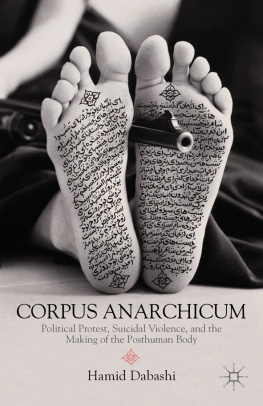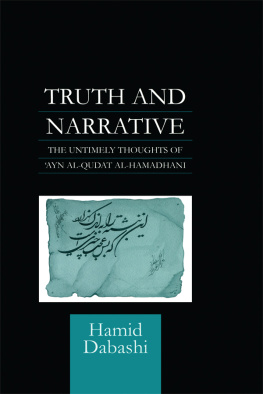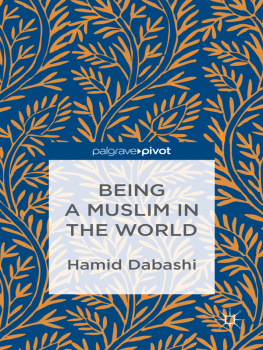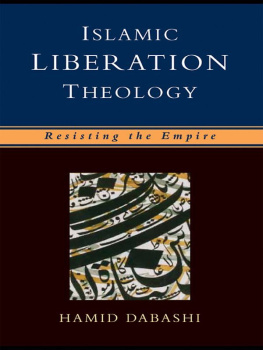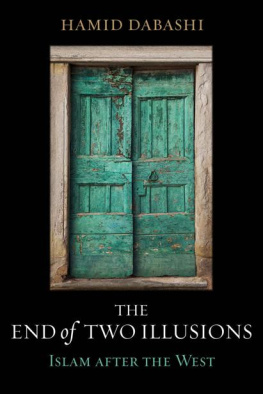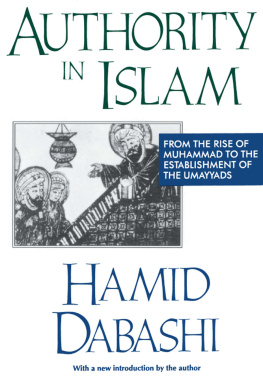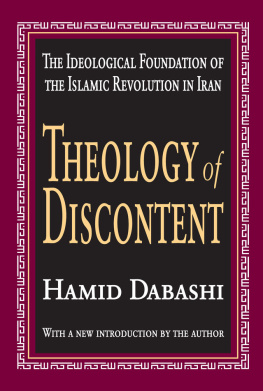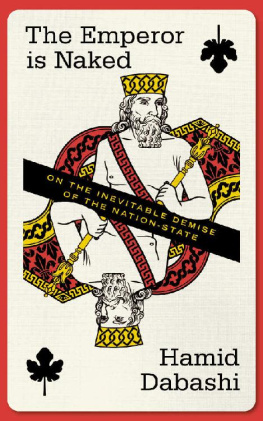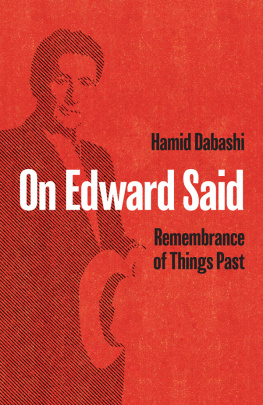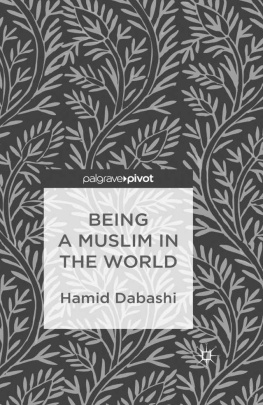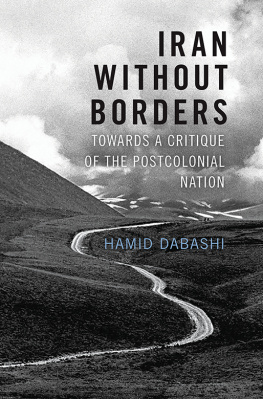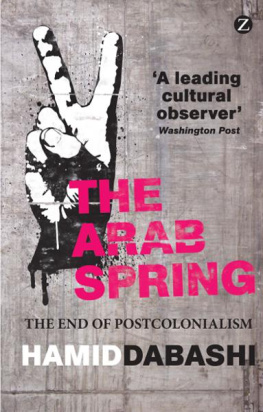H. Dabashi - Corpus Anarchicum
Here you can read online H. Dabashi - Corpus Anarchicum full text of the book (entire story) in english for free. Download pdf and epub, get meaning, cover and reviews about this ebook. year: 2012, publisher: Palgrave Macmillan US, genre: Religion. Description of the work, (preface) as well as reviews are available. Best literature library LitArk.com created for fans of good reading and offers a wide selection of genres:
Romance novel
Science fiction
Adventure
Detective
Science
History
Home and family
Prose
Art
Politics
Computer
Non-fiction
Religion
Business
Children
Humor
Choose a favorite category and find really read worthwhile books. Enjoy immersion in the world of imagination, feel the emotions of the characters or learn something new for yourself, make an fascinating discovery.
Corpus Anarchicum: summary, description and annotation
We offer to read an annotation, description, summary or preface (depends on what the author of the book "Corpus Anarchicum" wrote himself). If you haven't found the necessary information about the book — write in the comments, we will try to find it.
Corpus Anarchicum — read online for free the complete book (whole text) full work
Below is the text of the book, divided by pages. System saving the place of the last page read, allows you to conveniently read the book "Corpus Anarchicum" online for free, without having to search again every time where you left off. Put a bookmark, and you can go to the page where you finished reading at any time.
Font size:
Interval:
Bookmark:
Corpus Anarchicum
Political Protest, Suicidal Violence, and the Making of the Posthuman Body
Hamid Dabashi

CORPUS ANARCHICUM
Copyright Hamid Dabashi, 2012.
All rights reserved.
First published in 2012 by PALGRAVE MACMILLAN in the United Statesa division of St. Martins Press LLC, 175 Fifth Avenue, New York, NY 10010.
Where this book is distributed in the UK, Europe and the rest of the world, this is by Palgrave Macmillan, a division of Macmillan Publishers Limited, registered in England, company number 785998, of Houndmills, Basingstoke, Hampshire RG21 6XS.
Palgrave Macmillan is the global academic imprint of the above companies and has companies and representatives throughout the world.
Palgrave and Macmillan are registered trademarks in the United States, the United Kingdom, Europe and other countries.
ISBN: 978-1-137-26411-4
Library of Congress Cataloging-in-Publication Data
Dabashi, Hamid, 1951
Corpus anarchicum: political protest, suicidal violence, and the making of the posthuman body / Hamid Dabashi.
p. cm.
Includes .
eISBN 978-1-137-26413-8
1. Violence. 2. Suicide bombingsSocial aspects. 3. Human bodyPolitical aspects. 4. Political violenceSocial aspects. 5. TerrorismReligious aspectsIslam. I. Title.
HM886.D33 2012
303.6dc23 2012013160
A catalogue record of the book is available from the British Library.
Design by Scribe Inc.
First edition: October 2012
In Memoriam
Innocent victims of 9/11
on both sides of all borders
There is more wisdom in your body than in your deepest philosophy. And who knows for what purpose your body requires precisely your best philosophy?
Friedrich Nietzsche, Thus Spoke Zarathustra (1885)
Contents
Acknowledgments
This book has been simmering in my mind for more than a decade. Since the events of 9/11 I have been thinking and writing about the matter of suicidal violence. But it was not until the fateful events we call the Arab Spring a decade later that I knew my book was ready. It was the suicide of Mohamed Bouazizi (19842011), the young Tunisian street vendor who set himself on fire on December 17, 2010, in protest to police harassments, that dramatically concluded the whole notion of suicidal violence I was developing in this book and thus effectively completed my thoughts on the matter. Before that tragic event setting a massive transnational revolution in motion, it was the suicidal violence that targeted both the self and the other of the suicidal person that had triggered my study. After Mohamed Bouazizis suicide, it was the solitary site of that violence, the body of the person, and the sparing of others from the site of his suicide that gave the whole topography of my thinking about the matter its closure.
Earlier versions of a number of the following chapters have appeared in various venues. A much shorter version of Bodiless Faces was published in Visual Anthropology (1998). My thanks go to Walter Armburst for his having first asked me to write on veiling. An earlier draft of In the Absence of the Face appeared in a special issue of Social Research (Spring 2000) devoted to face. I am grateful to Arien Mack for the opportunity to reflect on the Biblical/Quranic figure of Josephs face in the essay that is now , In the Absence of the Face. Thanks to Georgio Verzotti, an earlier version of Bordercrossings was the catalogue text of a major retrospective that he had organized on the work of Shirin Neshat at Castello di Rivoli in Turin. My thanks go to him and to Ida Gianelli for their invitation to write the text. I wrote the chapter on Voice, Vision, and Veiling when Francesco Bernardelli graciously invited me on behalf of the Castello di Rivoli to open a major retrospective on Iranian filmmakers in Turin in March 2002. My sincere gratitude goes to Sara Bershtel for her cherished friendship and the caring confidence with which she received me in the peace and serenity of her home in Vermont where the idea of this book finally came together. Finally, my sincere gratitude goes to Farideh Koohi-Kamali of Palgrave Macmillan for all her gracious encouragements to bring this book finally to fruition.
Introduction
In the middle of High Street was the Barclays Bank. The Barclay brothers, who started Barclays Bank, were slave-traders. That is how they made their money. When the English outlawed the slave trade, the Barclay brothers went into banking. It made them even richer. Its possible that when they saw how rich banking made them, they gave themselves a good beating for opposing an end to slave tradingPeople just a little older than I am can recite the name of and the day the first black person was hired as a cashier at this very same Barclays Bank in Antigua. Do you ever wonder why some people blow things up? I can imagine that if my life had taken a certain turn, there would be the Barclays Bank, and there I would be, both of us in ashes.
Jamaica Kincaid, A Small Place (1988)
O n September 11, 2001, a handful of young Arabs hijacked four American airplanes and crashed three of them into the World Trade Center in New York City and the Pentagon in Washington, DC, right before the fourth went down into the woods of Pennsylvania.
I remember that when I saw President George W. Bush on television a few days later, standing on the rubble of the World Trade Center, hugging a New York firefighter under the American flag, and declaring that those responsible for the act would be punished, I had a sinking sense of macabre emptiness about his words. How could they be punished? They were all deaddead and done with, pulverized into smithereens right under his feet or hanging in suspended dust over his head. They were beyond all earthly punishments or revolutionary rewards. They had either joined some supernal bliss or else descended into a cavernous hellin either case, beyond the reach of the US military might. They could hear nothing. They were beyond reproach. They were beyond.
I remember that when I went down to the vicinity of Ground Zero on that fateful September 11, I noticed the bizarre spectacle of a band of Japanese tourists collecting the ashes that were falling down on cars parked in the Soho areas. What were they doing? What strange conception of a souvenir was that? There, in that gathered dust the Japanese tourists were collecting, were the ashes of the World Trade Center and its inhabitants and assailants, all pounded into a grayish powder. The Persian poet in me was suddenly incorrigibleit was surely the ghostly sight of all those dead human beings turned into collected dust and now gently brushed into plastic bags by Japanese tourists that reminded me ofwho else?Omar Khayyam:
Listen again. One evening at the Close
Of Ramazan, ere the better Moon arose,
In that old Potters Shop I stood alone
With the clay Population round in Row.
This I remembered from Edward FitzGeralds reading of Omar Khayyam. But I also remembered the gist of another quatrainthis one from my own mothers popular versionthat included a suggestion to the effect that when you wipe dust from your forehead, be very gentle, because the dust you are disturbing could very well be the remains of a kind and tender human being. Nothing was delicate on that horrific Tuesday afternoon down on the corner of Houston and Hell, however. But Edward FitzGeralds Omar Khayyam would not let go:
And, Strange to tell, among that Earthen Lot
Some could articulate, while others not:
And suddenly one more impatient cried:
Who is the Potter, pray, and who the Pot?
Next pageFont size:
Interval:
Bookmark:
Similar books «Corpus Anarchicum»
Look at similar books to Corpus Anarchicum. We have selected literature similar in name and meaning in the hope of providing readers with more options to find new, interesting, not yet read works.
Discussion, reviews of the book Corpus Anarchicum and just readers' own opinions. Leave your comments, write what you think about the work, its meaning or the main characters. Specify what exactly you liked and what you didn't like, and why you think so.

